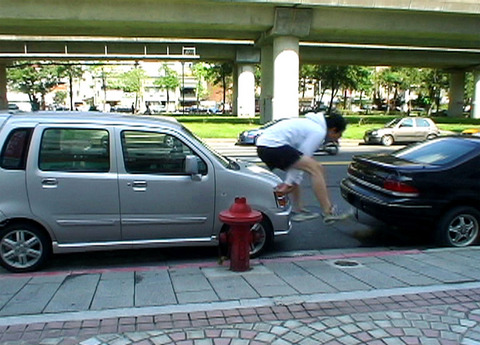In the era of globalization when terrorism, deadly viruses and global warming seem to threaten man's existence, uncertainty and disquietude have become creeping motifs in our daily lives. Chi-wen Gallery, a lively young venue devoted to the contemporary art scene in Taiwan, is currently hosting a video exhibition entitled Age of Anxiety which takes its cue from global undercurrents of angst and collective fear and features works by Tsui Kuang-yu (崔廣宇) and Peng Hung-chih (彭弘智).
Peng, who resides in New York, has since 2000 been offering insights into the human condition from a dog's perspective by making video art works starring his pet pooch Yuki.
In the three videos on display at the gallery, Peng's dog inscribes sections of Christian, Buddhist and Taoist religious texts onto a wall by licking it. The videos were made by playing backwards the images of the animal eating dog food spread in the shape of characters on the wall.

PHOTO COURTESY OF CHI-WEN GALLEY
The sacred text is ridiculed through its creation by a dog rapaciously gulping down the food shaped in English, Chinese and Sanskrit characters. At the same time, that sacred knowledge is reproduced by an animal which is deemed inferior to human beings is an ironic statement and refers to the problem of terrorism as religious faith.
“I think the many problems we confront today are the West's fault, especially religious conflicts. As a culturally hybrid artist from the East, I believe the interpretations I make concerning these issues can be very different from those of Western artists, though sometimes I run the risk of offending people for being too direct,” Peng told the Taipei Times.
A good example of Peng's outspokenness can be found in his previous exhibition held in New York in which paragraphs in the Bible referring to violent acts and thoughts are translated into Arabic and unveiled by his dog. “Many people believe the texts are from the Koran,” Peng said while grimacing.
Peng will expand the project to include Judaism, Sikhism and Shintoism. “I like to concentrate my attention on one specific subject for a long period of time,” said Peng, who sees the video work as the beginning of his exploration of the relationship between man and God.
In The Shortcut to the Systematic Life: City Spirits (系統生活捷徑 – 城市精神), Tsui is subject and director of lighthearted videos shot in Taipei and London and which reveal the absurd side of contemporary urban life in a manner similar to a slapstick silent film.
The five videos, each 90 seconds long, show him turning familiar urban landscapes into sports arenas. In one segment, the 32-year-old artist jumps over trash cans, roadside bushes and motorcycles parked on the sidewalk as if he were in a hurdles race, while in another Tsui is spotted climbing down mounds of garbage and piles of abandoned cars. The up-and-coming artist mischievously waves a checkered flag at cars stopped at traffic lights in a humorous nod to racing in another clip.
Hailed locally as an artist who combines performance arts with video installation, Tsui is known for his humorous and imaginative takes on metropolitan life. City Spirits provides an insightful survey of the relationship between urbanites and their surroundings through the artist's aberrant acts filmed in public spaces — “urban crevices,” according to Tsui — and turns reality into surreal fragments of city life.
Exhibition Notes:
What: Age of Anxiety (從幽默到荒謬)
Where: Chi-wen Galley, 3F, 19, Ln 252, Dunhua S Rd Sec 1, Taipei (台北市敦化南路一段252巷19號3樓). Call (02) 8771-3372
When: Until Sept. 30

Towering high above Taiwan’s capital city at 508 meters, Taipei 101 dominates the skyline. The earthquake-proof skyscraper of steel and glass has captured the imagination of professional rock climber Alex Honnold for more than a decade. Tomorrow morning, he will climb it in his signature free solo style — without ropes or protective equipment. And Netflix will broadcast it — live. The event’s announcement has drawn both excitement and trepidation, as well as some concerns over the ethical implications of attempting such a high-risk endeavor on live broadcast. Many have questioned Honnold’s desire to continues his free-solo climbs now that he’s a

Francis William White, an Englishman who late in the 1860s served as Commissioner of the Imperial Customs Service in Tainan, published the tale of a jaunt he took one winter in 1868: A visit to the interior of south Formosa (1870). White’s journey took him into the mountains, where he mused on the difficult terrain and the ease with which his little group could be ambushed in the crags and dense vegetation. At one point he stays at the house of a local near a stream on the border of indigenous territory: “Their matchlocks, which were kept in excellent order,

Jan. 19 to Jan. 25 In 1933, an all-star team of musicians and lyricists began shaping a new sound. The person who brought them together was Chen Chun-yu (陳君玉), head of Columbia Records’ arts department. Tasked with creating Taiwanese “pop music,” they released hit after hit that year, with Chen contributing lyrics to several of the songs himself. Many figures from that group, including composer Teng Yu-hsien (鄧雨賢), vocalist Chun-chun (純純, Sun-sun in Taiwanese) and lyricist Lee Lin-chiu (李臨秋) remain well-known today, particularly for the famous classic Longing for the Spring Breeze (望春風). Chen, however, is not a name

There is no question that Tyrannosaurus rex got big. In fact, this fearsome dinosaur may have been Earth’s most massive land predator of all time. But the question of how quickly T. rex achieved its maximum size has been a matter of debate. A new study examining bone tissue microstructure in the leg bones of 17 fossil specimens concludes that Tyrannosaurus took about 40 years to reach its maximum size of roughly 8 tons, some 15 years more than previously estimated. As part of the study, the researchers identified previously unknown growth marks in these bones that could be seen only